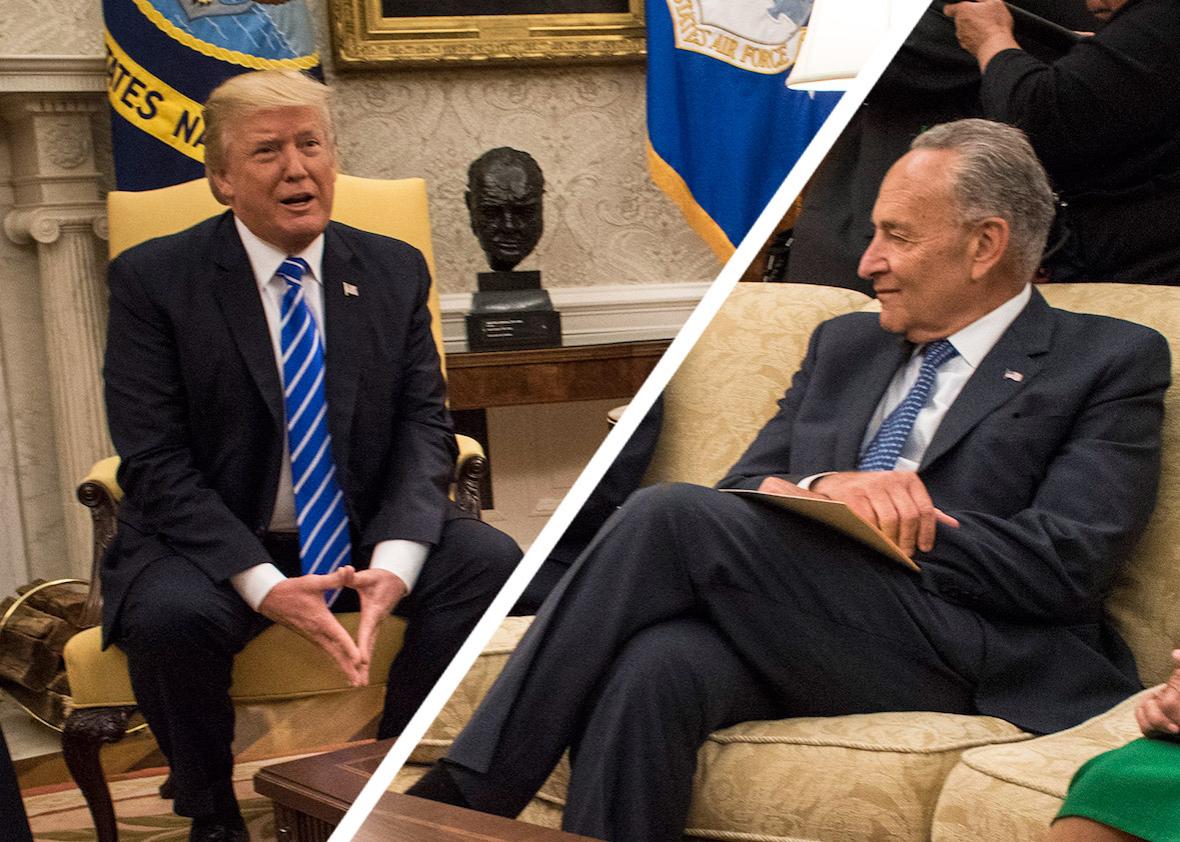Now that he’s done an end-run around the Republican leadership in Congress on a short-term debt limit increase, what’s stopping Donald Trump from hammering out bipartisan agreements with his new pals Chuck and Nancy on amnesty for Dreamers, money to stabilize the Obamacare exchanges, or if we really want to start thinking big, a trillion-dollar, deficit-financed infrastructure package?
There are many things stopping him. Although the president has subjected GOP leaders Paul Ryan and Mitch McConnell to yet another humiliating climbdown, they still have the power to set the congressional agenda. There’s also no way the president can become a bipartisan dealmaker if congressional Democrats balk at the prospect, which they very well might. And given the antipathy rank-and-file Democratic voters feel for the commander in chief, it’s hard to imagine their elected representatives getting away with too much chumminess.
So yes, there are obstacles. But like the first daughter, who has carefully positioned herself as a champion of paid family leave, the Paris Agreement on climate change, and Planned Parenthood among other unconservative causes, Trump is desperate to win over a hostile press corps. I have no doubt that Trump is going to at least try to reinvent himself as Trump the Triangulator, or if you prefer, as President Ivanka.
To understand why, consider that the major party coalitions are in flux. Not long ago, one could safely say that while the Democratic Party was a big, fractious, and unwieldly coalition divided between liberals and moderates, Republicans were a relatively cohesive coalition of conservatives who mostly agreed on the important issues of the day. But that’s changing. Democrats are more ideologically unified than they’ve been in years. Republicans, meanwhile, find themselves ideologically split between Reaganite conservatives and working-class nationalists and, when it comes to temperament, between enraged doom-mongers and placid pragmatists.
The neat trick Trump pulled off during his campaign for the GOP presidential nomination was to simultaneously appeal to enraged doom-mongers and working-class nationalists—constituencies that don’t entirely overlap, and that when unified were enough to get him over the top. Once in office, however, he has found it exceedingly difficult to navigate the as-yet undrained swamp. While working-class nationalists were an essential part of Trump’s electoral coalition, they are massively underrepresented among Republican lawmakers. The result is that with the exception of immigration, where Sens. Tom Cotton and David Perdue have advanced soft-nationalist immigration reform, there hasn’t been a groundswell of populist Republicans willing and able to back Bannon-esque legislation on trade, taxes, and infrastructure, and the skeletal policy team in the Trump White House hasn’t exactly filled the breach.
To make matters worse, while Trump appeals to the GOP’s enraged doom-mongers, congressional Republicans are for the most part led by people who are at once placid pragmatists and Reaganite conservatives, which is to say his opposites in every respect. By all accounts, Ryan and McConnell and the people closest to them see the president as a reckless ignoramus. It’s hardly surprising that they’ve found working with him exceedingly difficult. The House speaker and the Senate majority leader have both done their best to Trumpify their pre-existing domestic policy agenda of cutting taxes for the rich and paring back the safety net in various ways—with little success. Trump hasn’t helped matters by distancing himself from their efforts by, for example, declaring their profoundly unpopular Obamacare overhaul “mean,” and most recently by gleefully going over their heads on the debt limit. One gets the impression that the president wouldn’t mind all that much if Ryan and/or McConnell were booted from office, or if Republicans lost the House.
What Trump really cares about is claiming credit for concrete policy victories, and he’s not especially fussy about the details. Because Republicans have proved incapable of getting big, bold, brag-worthy legislation to his desk, it’s natural that he’d turn to congressional Democrats. Nancy Pelosi and Chuck Schumer recognize that the president isn’t super attuned to the finer points of domestic policy and that he just wants wins. The more-united Democrats are thus in a position to maneuver the president into achieving some of their short-term goals on immigration (at a minimum, amnesty for the Dreamers) and spending (more of it, please). In return, Trump would get his triumphant signing ceremonies in the White House Rose Garden.
Yes, you’d need more pliable GOP leaders to make this scenario come to pass. But Republicans in Congress are so bitterly divided that a majority of them might be willing to isolate purist partisans and join in the bipartisan frenzy, if only on some issues.
The question for Democrats is whether the benefits of teaming up with Trump outweigh the almost certainly high costs. By cutting deals with the president, Democrats in Congress implicitly acknowledge that he is not History’s Greatest Monster, which is an affirmation that he wants (and I’m guessing Ivanka Trump and Jared Kushner want) very badly, yet which risks muddying the party’s anti-Trump message. And how will cutting deals with Trump affect Democratic chances in 2018? There’s a case to be made that embracing Trumpian triangulation could shore up vulnerable Democratic senators in states Trump won in 2016, and that it would make for an appealing contrast with do-nothing Republicans. However, it’s also possible that cutting deals with Trump would demotivate the Democratic base and fuel a wave of anti-establishment challengers.
Do I believe Trumpian triangulation will save the Trump presidency? Probably not. But given Trump’s poisonous relationship with Ryan and McConnell and how badly he wants positive news coverage, he’d be foolish not to give it a shot.
